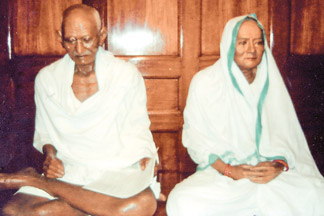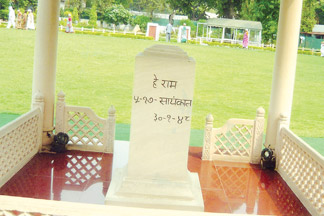Mahatma Gandhi's 64th death anniversary falls today
Text and pictures MAR Manukulasooriya, Hiriyala
group correspondent
Mahathma Gandhi is considered the greatest man born in the 20th
century.
Born on October 2, 1869 at Porbandar, Kathiawar in India, Gandhi
started his public career in South Africa where the white race ruled and
Indians and native Africans alike were treated as slaves and outcasts.
He found himself subjected to colour discrimination. He organized the
Indian Congress and organized the Indians Ambulance Corps for the
British in the Boer war.
|

A statue of Gandhi with his spinning machine (Gandhi Museum) |
In 1904, he established the weekly journal 'Indian opinion'. He
organized the first Satyagraha campaign against the proposed Asiatic
Ordinance directed against Indian immigration in Transvaal and then
against compulsory registration of Asiatics (The Black Act). For this he
was sentenced to two months' imprisonment in Johannesburg jail.
He again campaigned against General Smuts who broke an agreement with
a bonfire of registration certificates and was again sentenced to jail
for three months.
After returning to India, he established the satyagraha ashram on
Sabarmati River in 1917. He led a successful satyagraha for rights of
peasants on indigo plantations in Champaran; let a strike of milk
workers at Ahamedabad, a satyagraha for peasants in Kheda; organized a
nation-wide hartal by suspension of activity for a day against the
Rowlatta Bills; organized satyagraha of non-cooperation; burned foreign
cloth in Calacutta; led the historic salt march to Dandi; launched civil
disobedience in 1940 against Britain and refused refusal to all Indians
to express their opinions regarding World War II and launched the quit
India Movement.
Imprisonment
Gandhi was arrested and imprisoned several times. He resolved to wear
a loin cloth to propagate homespun cotton and to signify his
identification with the people. He went on several fasts unto death. He
attended several conferences with the British, signed pacts with them
and rebelled against all their proposals.
He brought out 'young India', an English weekly and 'navajivan' in
Gujarati.
He tried to help end untouchability and encouraged spinning and
weaving and handicrafts and cottage industries. He opposed the Congress
decision to accept division of the country in to India and Pakistan.
When communal clashes between Hindus and Muslims broke out in many parts
of India, he undertook fasts till there was peace.
|

Wax figures of Mahatma and Kasturba Gandhi (Gandhi Museum) |
Gandhi was a Great Educationist. He knew that education is an
investment in a person's future. His education philosophy embodied not
only the principles expounded in the West, but also, those considered
essential by 'Eastern Thinkers' such as Lord Buddha. His thinking
emphasized that education should give priority not only to train the
head and hand, but should include as a fundamental factor; the training
of the heart.
He was a philosopher too. Once he said "You must keep your doors and
windows fully open for all the winds from four directions to blow in,
but, you must have your feet, firmly on your own ground so that you will
not be swept away by the wind".
Death
On January 30,1948 while holding a prayer meeting at Birla House,
Delhi, he was shot dead by Hindu fanatic Nathuram Godse. The light of
India died with Gandhiji. The entire world was shaken and shocked with
grief and sorrow. The sad news was aired to the Nation through the air
waves of all India Raido by Prime Minister of India.
"The light has gone out of our lives. There is darkness everywhere.
Our beloved leader Bapu, Father of our nation is no more. The light that
shone in this country was no ordinary light. The light that has
illuminated this country for many more years and a thousand years later
that light will still be seen in this country and the world will see it
and it will give solace to innumerable hearts".
|

The monument at the place where Gandhi was shot dead |
The Birla House in New Delhi is now a Museum dedicated to Mahatma
Gandhi. Upon entering the Birla House the visitor can see the worldly
remains of Mahathma Gandhi among which are a walking stick, a spoon and
a pair of spectacles. Newspapers reports, photos, and eyewitness
accounts of Mahatma's assassination are displayed there and recreates
vividly that fateful day. In a special room wax figures of Mahathma and
Kasturba Gandhi sit on the floor cross legged. It is almost as if they
are alive. A documentary compiled about the last 20 minutes of Mahatma's
life is shown to the visitors as well.
Starting from the Birla House, the final footsteps of Mahatma Gandhi
are marked in cement for the visitors to see. The steps show the way to
the place Mahatma went everyday with his followers for worship. It is
there that Mahatma was shot dead. The exact spot where he fell is marked
with a simple monument known as "The Martyr's Column". The words "Hare
Ram" are written there too. |



